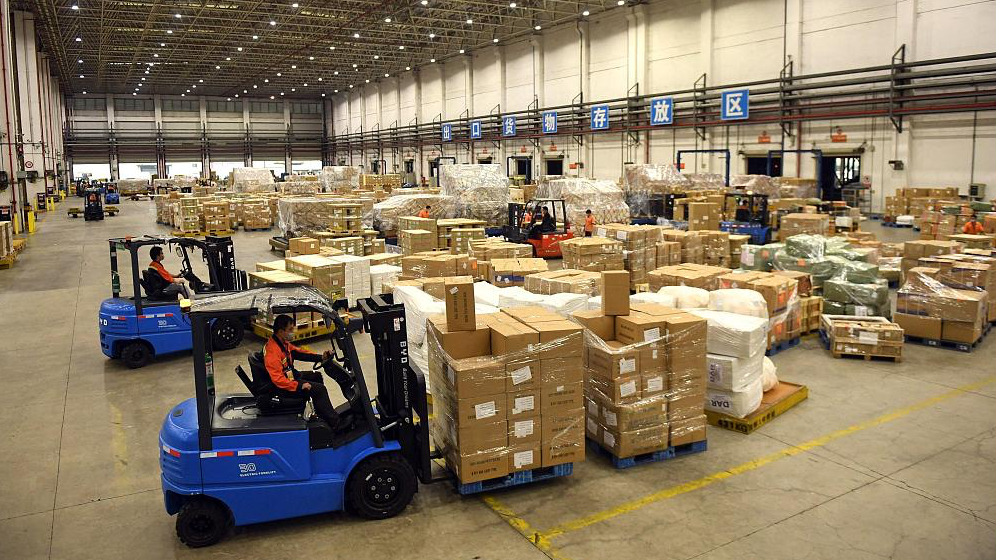
China has provided massive amounts of medical supplies to 153 countries and 15 international organizations, and sent medical teams to 34 countries. /CFP
China has provided massive amounts of medical supplies to 153 countries and 15 international organizations, and sent medical teams to 34 countries. /CFP
Editor's note: Tian Huifang is a senior research fellow of Institute of World Economics and Politics, Chinese Academy of Social Sciences. The article reflects the author's opinions and not necessarily the views of CGTN.
Over the past three years, China has initiated a series of major assistance measures focusing on public health, sustainable development, food security, debt reduction to help developing countries cope with the COVID-19 pandemic and resume economic and social development.
Leading international cooperation against COVID-19
For the past three years, China has actively advocated international cooperation in the fight against COVID-19. It also has provided assistance to the international community in various ways within its capacity, including donating medical supplies, sending medical experts and sharing pandemic prevention and control experiences.
China was the first country to pledge to make COVID-19 vaccines a global public good. It was also the first to support intellectual property rights exemptions for vaccine research and development and the first to cooperate with developing countries in vaccine production. China was the largest supplier of vaccines to other countries.
A 2022 report on international cooperation in China's COVID-19 vaccine industry released by the 21st Century New Health Research Institute showed that the country has supplied more than 2.2 billion vaccine doses to more than 120 countries and international organizations. China has also carried out joint research and development and production of COVID-19 vaccines with developing countries such as the United Arab Emirates, Egypt, Indonesia, Turkey and Brazil. China has provided massive amounts of medical supplies to 153 countries and 15 international organizations, and sent medical teams to 34 countries. China's efforts have played a key role in addressing the global shortage of the COVID-19 vaccine and added confidence and strength to the fight against the virus in developing regions.
Promoting global food security and supply stability
Due to the impact of COVID-19, extreme weather, loose monetary policies of major developed economies and other factors, international food prices remain high. Many low-income countries are trapped in the dilemma of "unaffordable food". The Russia-Ukraine conflict and the extreme sanctions imposed by the U.S. and the West on Russia have additionally impacted the global food industry chain and supply chain.
In 2020, despite the severe impact of the pandemic on international trade, China exported 3.54 million tons of grain to help alleviate the global food shortage to some extent. In 2021, China advanced the Global Development Initiative, making food security one of the eight key areas of cooperation. China also helped promote agricultural development in developing countries through emergency food donations, technical assistance and agricultural investment. China has conducted agricultural science and technology exchanges with over 140 countries and regions. It has also introduced more than 1,000 agricultural technologies to developing countries. That effort has resulted in an average 30-60% increase in crop production in project areas.
China has also taken an active part in the United Nations World Food Program, which has established a global humanitarian emergency warehouse and hub in the country. On the WTO platform, China has called for open food trade, and urged the lifting of unilateral sanctions and maintained the security and stability of the global industrial and supply chains. It also has provided a fair and reasonable international trade environment for agricultural improvements in developing countries.
Easing financial difficulties of highly indebted developing countries
Developing countries have been plagued by debt in recent years, and the outbreak of the COVID-19 pandemic additionally exacerbated their liquidity and solvency problems. In response to the crisis, China supported the postponement of debt repayment under the Debt Service Suspension Initiative by the G20, and reached agreements with many countries to defer or reschedule debt repayment, with a negotiated amount of $10.8 billion, much higher than that of other countries.
China has also helped developing countries overcome the economic, financial and public health pressures brought about by the pandemic through multilateral platforms such as the Asian Infrastructure Investment Bank (AIIB). The AIIB created a COVID-19 Crisis Recovery Facility in 2020 to support members and clients in alleviating and mitigating economic, financial and public health pressures arising from COVID-19. The effort has benefitted 12 countries including Indonesia, Pakistan, India, the Philippines, Kazakhstan, Turkey and Georgia, with a total value of over 5.9 billion U.S. dollars.
In general, over the past three years, China has conducted the most intensive and wide-ranging emergency humanitarian action since the founding of the People's Republic of China. It has made positive contributions to the world's response to the pandemic. In addition, China has advanced the growth of global development while demonstrating the responsibilities of being the world's largest developing country.